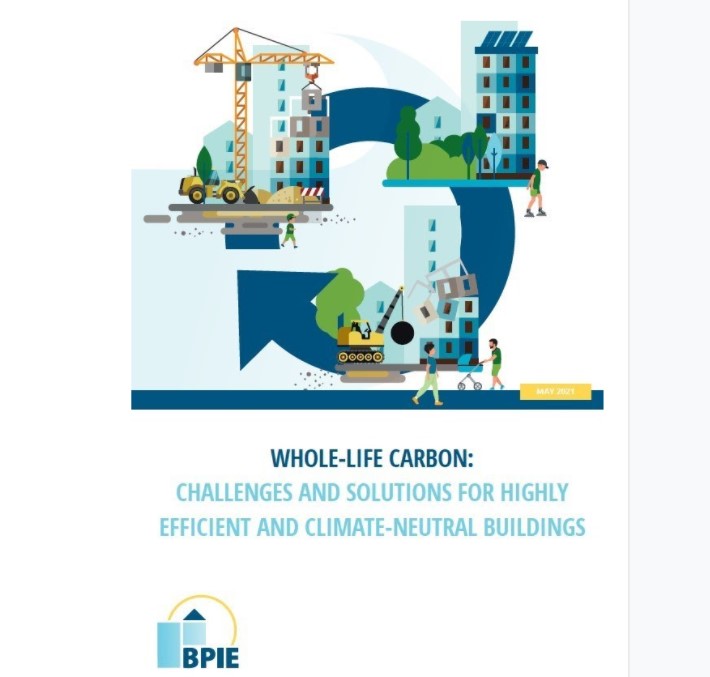BPIE report urges EU to incorporate the carbon footprint of construction into policy

|
Contents |
[edit] Introduction
Research from the Buildings Performance Institute Europe (BPIE) published in May 2021, suggests that while some European Union members have introduced comprehensive policies to reduce the carbon footprint of buildings and construction, this should now be coordinated and regulated at the European level.
The report 'Introducing whole-life carbon metrics: Recommendations for highly efficient and climate-neutral buildings', stresses how the EU's legislative changes for buildings and construction are a critical opportunity to create policy and investment certainty about carbon performance rules.
[edit] EU environmental goals
The EU aims to be climate neutral by 2050, requiring a fundamental transformation of the construction industry. Direct building CO2 emissions need to more than halve by 2030 to be on track for the 2050 target.
In its Renovation Wave strategy, the European Commission announced its intention to introduce a '2050 whole life-cycle performance roadmap' to reduce carbon emissions from buildings' by 2023.
Oliver Rapf, Executive Director of BPIE said,"For new buildings built to the highest energy efficiency standards, the low operational energy demand means that embodied carbon becomes the most significant source of carbon emissions over the building's lifetime.”
Embodied carbon emissions are associated with energy consumption and chemical processes during raw material extraction, manufacture, transportation, assembly, replacement, construction, demolition and disposal, accounting for approximately 10% to 20% of EU buildings' CO2 footprint.
To address this, BPIE suggests a common EU approach to whole-life carbon (WLC) emissions. This will require better coordination across policy measures addressing and affecting the different stages of the construction value chain.
[edit] Recalibrating targets
In the report, the BPIE finds that the introduction of a '2050 whole life-cycle performance roadmap', scheduled for 2023, is out of sync with the current legislative review process.
Rapf said, "Policy action taken by a number of EU member states demonstrates that whole-life carbon policies are possible and desirable. The European Commission should reflect this in its forthcoming proposals in 2021 (for example of the Energy Performance of Buildings Directive and the Energy Efficiency Directive), to make sure that we don't lose time in the fight against climate change".
[edit] Related articles on Designing Buildings
- Buildings Performance Institute Europe BPIE.
- Carbon neutral buildings.
- Embodied carbon.
- Energy Performance of Buildings Directive.
- EU Referendum - Environmental and climate change consequences for the built environment.
- Europe.
- Net zero carbon 2050.
- New European Bauhaus.
- Renovation Wave Strategy RWS.
Featured articles and news
RTPI leader to become new CIOB Chief Executive Officer
Dr Victoria Hills MRTPI, FICE to take over after Caroline Gumble’s departure.
Social and affordable housing, a long term plan for delivery
The “Delivering a Decade of Renewal for Social and Affordable Housing” strategy sets out future path.
A change to adoptive architecture
Effects of global weather warming on architectural detailing, material choice and human interaction.
The proposed publicly owned and backed subsidiary of Homes England, to facilitate new homes.
How big is the problem and what can we do to mitigate the effects?
Overheating guidance and tools for building designers
A number of cool guides to help with the heat.
The UK's Modern Industrial Strategy: A 10 year plan
Previous consultation criticism, current key elements and general support with some persisting reservations.
Building Safety Regulator reforms
New roles, new staff and a new fast track service pave the way for a single construction regulator.
Architectural Technologist CPDs and Communications
CIAT CPD… and how you can do it!
Cooling centres and cool spaces
Managing extreme heat in cities by directing the public to places for heat stress relief and water sources.
Winter gardens: A brief history and warm variations
Extending the season with glass in different forms and terms.
Restoring Great Yarmouth's Winter Gardens
Transforming one of the least sustainable constructions imaginable.
Construction Skills Mission Board launch sector drive
Newly formed government and industry collaboration set strategy for recruiting an additional 100,000 construction workers a year.
New Architects Code comes into effect in September 2025
ARB Architects Code of Conduct and Practice available with ongoing consultation regarding guidance.
Welsh Skills Body (Medr) launches ambitious plan
The new skills body brings together funding and regulation of tertiary education and research for the devolved nation.
Paul Gandy FCIOB announced as next CIOB President
Former Tilbury Douglas CEO takes helm.
UK Infrastructure: A 10 Year Strategy. In brief with reactions
With the National Infrastructure and Service Transformation Authority (NISTA).






















